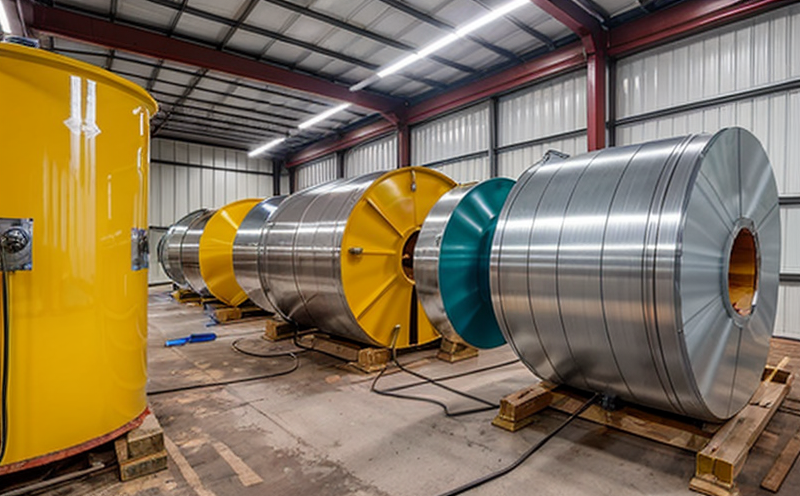ISO 2812-3 Alkaline Resistance Testing of Paints
The ISO 2812 series is a set of international standards that provide detailed methodologies for the testing and evaluation of coatings, paints, and related materials used in various industries. Specifically, ISO 2812-3 focuses on determining the resistance to alkaline solutions, which is crucial for ensuring durability and performance in marine environments.
Alkaline resistance tests are particularly important in the maritime sector where ships and their equipment are exposed to harsh conditions like saltwater, industrial chemicals, and aggressive marine organisms. The test measures how well a coating can withstand exposure to an alkaline solution that simulates real-world scenarios such as discharge water from ship ballast tanks or cleaning solutions used in harbors.
The testing procedure involves applying the paint sample onto a standardized substrate, allowing it to cure according to manufacturer specifications. After curing, the samples are immersed in a 5% sodium hydroxide solution (NaOH), which is an alkaline environment that mimics certain industrial and environmental conditions. The specimens remain in this solution for specified durations, typically ranging from 24 hours up to several weeks depending on the test's requirements.
During immersion, it's essential to monitor any changes in appearance or physical properties of the paint film. These observations include checking for blistering, cracking, peeling, or loss of adhesion between the coating and substrate. Additionally, color retention is also evaluated as a significant factor influencing both aesthetic appeal and functional integrity.
The results from these tests are critical inputs for quality assurance processes within shipyards and maritime equipment manufacturers. They help ensure that paints meet stringent regulatory requirements set forth by organizations like Classification Societies (e.g., Lloyd's Register, DNV GL) as well as international standards such as ISO itself.
- Benefits: Ensures compliance with global regulations regarding maritime safety and environmental protection.
- Benefits: Provides valuable data for continuous improvement in product development cycles.
Benefits
Conducting ISO 2812-3 alkaline resistance testing offers numerous benefits that are crucial not only for meeting regulatory standards but also enhancing the overall quality and reliability of marine coatings. Firstly, it helps manufacturers comply with stringent requirements set by classification societies such as Lloyd's Register or DNV GL, ensuring their products meet international maritime safety norms.
Secondly, this testing process enables companies to improve their product lines through continuous evaluation and refinement based on actual performance data obtained during these trials. By understanding how well different formulations perform under alkaline conditions, developers can make informed decisions about ingredient selection and formulation adjustments aimed at achieving longer-lasting protection against corrosion.
Thirdly, compliance with such rigorous testing procedures demonstrates a commitment to excellence in the eyes of both regulatory bodies and end-users alike. This transparency fosters trust between stakeholders involved throughout the supply chain—from raw material suppliers to final users operating vessels across diverse operational environments.
Environmental and Sustainability Contributions
The importance of ISO 2812-3 alkaline resistance testing extends beyond mere quality assurance; it plays a vital role in promoting sustainability within the marine industry. By ensuring that coatings used on ships are capable of resisting aggressive alkaline environments, we contribute to minimizing environmental impacts associated with maritime activities.
Alkaline solutions can be found in various stages of ship operations and maintenance processes, including ballast water treatment systems and cleaning procedures performed inside harbors. If coatings did not possess adequate resistance against such conditions, they could degrade prematurely leading to increased frequency of maintenance tasks. This would result in higher resource consumption during re-coating activities, contributing unnecessary waste into landfills.
Moreover, selecting materials that pass stringent alkaline resistance tests allows for the development and deployment of more sustainable alternatives like bio-based or recycled content paints. Such innovations not only extend service life but also reduce dependency on non-renewable resources used in traditional synthetic polymers.
Competitive Advantage and Market Impact
In today's competitive market, having robust testing capabilities is an asset that sets companies apart from competitors. For those involved in marine equipment manufacturing or repair services, being able to demonstrate compliance with ISO 2812-3 standards can be a key differentiator when bidding on contracts.
Customers—from shipowners looking for reliable suppliers of anti-corrosion solutions to regulatory bodies overseeing vessel inspections—place significant value on proven performance data. Demonstrating that your products have successfully passed these tests instills confidence among potential buyers and partners, thereby enhancing your company's reputation in the market.
Achieving certification through rigorous testing also opens up new opportunities for expanding into international markets where stringent environmental protection laws are in place. Meeting these standards can help you tap into emerging sectors like green shipping initiatives aimed at reducing carbon footprints across entire fleets.





